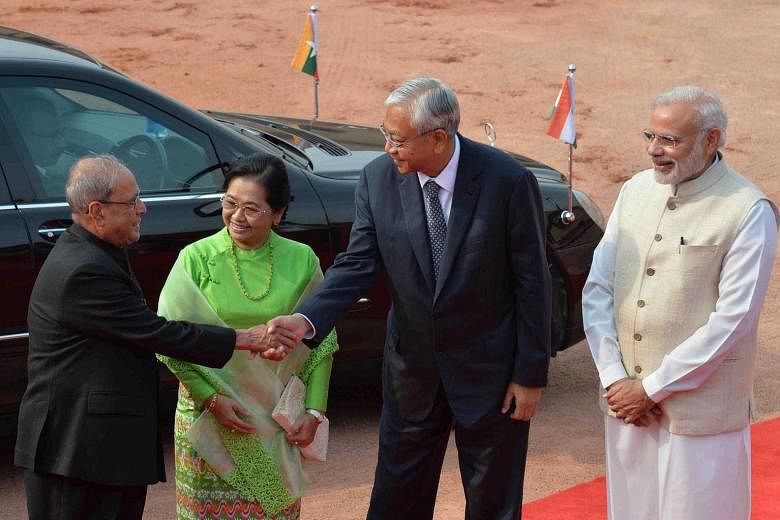India and Myanmar have agreed to continue efforts to combat insurgent activities in the border areas and infuse new energy into a much- delayed highway project during Myanmar President U Htin Kyaw's visit to India.
Prime Minister Narendra Modi, who held talks with U Htin Kyaw yesterday, said they had "useful discussions" on a range of issues, including security, in what is the highest-level engagement between the two countries since Ms Aung San Suu Kyi's National League for Democracy took power early this year.
"We recognised that our security interests are closely aligned," Mr Modi said in a statement issued after the talks. The two countries would "actively cooperate to combat the common challenges of terrorism and insurgent activity" and "remain sensitive to each other's strategic interests", he added.
Myanmar's border areas provide a sanctuary for several insurgent groups which are active in India's north-east region.
The two neighbours also signed four agreements, including one for building and upgrading 69 bridges as part of a trilateral highway project connecting India, Myanmar and Thailand. The highway project is set to miss its deadline for completion this year. Other deals included cooperation on renewable energy.
India's policy towards Myanmar has, in large part, been driven by its need for help in cracking down on insurgents along its border, in addition to its need for energy. India has been keen to tap oil and gas fields in Myanmar, with economic ties seen to be below potential. Bilateral trade amounted to just US$1.57 billion (S$2.1 billion) from 2014 to last year, according to the Indian government.
Foreign policy analysts said U Htin Kyaw's India visit, his first overseas trip since becoming President, is significant and an opportunity for India to recast ties with its neighbour under the new leadership. India had, in the 1990s, reversed its position of support for Ms Suu Kyi to reach out to the military junta.
Her maiden visit to China was keenly watched in India and followed closely by External Affairs Minister Sushma Swaraj's visit to Myanmar.
"It is certainly an important beginning for an old relationship. Essentially, we are now dealing with a largely democratic Myanmar. The border security is the complex issue (in ties). We want more cooperation from Myanmar. Whether they are willing, we will have to see," said former Indian ambassador to Myanmar Rajiv Bhatia.
"The President is coming to India first. He is the formal head of state and government. He will be followed by Aung San Suu Kyi in October. In comparison to Suu Kyi going only to China, it is not a bad package (for India)."
Indian officials said U Htin Kyaw's visit provided an opportunity to take stock of where the two countries stood on various bilateral issues and help understand the new Myanmar government's priorities.
U Htin Kyaw indicated that ties with India were important.
"I am pleased to note that there has been an increased level of exchanges, especially after our new government assumed office in March. My current visit to India is aimed at enhancing traditional ties of friendship between the two countries," he said.

